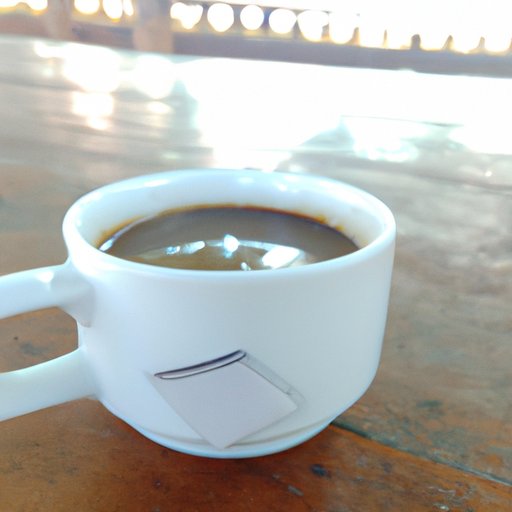Introduction
Caffeine is a natural stimulant found in beverages like coffee, tea, energy drinks, soft drinks, and even chocolate. It’s a drug that affects your central nervous system and can provide a boost of energy, alertness, and focus. But how much caffeine is actually in each of these drinks? And which one has the most caffeine?
In this article, we’ll explore the caffeine content of different drinks, compare their levels, and provide a guide for choosing the most caffeinated beverage. We’ll also discuss the potential benefits and risks of consuming high amounts of caffeine.

Comparing the Caffeine Content of Different Drinks
The amount of caffeine in any drink depends on several factors, including the type of beverage, its serving size, and the brand. Generally speaking, coffee and energy drinks have higher levels of caffeine than tea and soft drinks. Let’s take a closer look at the caffeine content of each type of beverage.
Investigating the Highest Sources of Caffeine
When it comes to the highest sources of caffeine, coffee is the clear winner. Depending on the type, a single cup of brewed coffee can contain anywhere from 95 to 200 milligrams (mg) of caffeine. Espresso contains even more, with one shot containing between 63 and 126 mg of caffeine.
Energy drinks are also high in caffeine, with most brands containing between 70 and 200 mg per serving. Some energy drinks contain as much as 500 mg of caffeine, so it’s important to read the label before consuming them. Tea and soft drinks typically contain less caffeine than coffee and energy drinks, with an 8-ounce cup of tea containing between 14 and 60 mg of caffeine and a 12-ounce can of soda containing between 30 and 40 mg.
Examining the Amount of Caffeine in Popular Beverages
Let’s take a closer look at the caffeine content of some of the most popular beverages:
- Coffee: Brewed coffee contains 95-200 mg of caffeine per 8-ounce cup.
- Espresso: A single shot of espresso contains 63-126 mg of caffeine.
- Energy Drinks: Energy drinks typically contain 70-200 mg of caffeine per 12-ounce can.
- Tea: An 8-ounce cup of tea contains 14-60 mg of caffeine.
- Soft Drinks: A 12-ounce can of soda typically contains 30-40 mg of caffeine.
A Guide to Choosing the Most Caffeinated Drink
If you’re looking for a drink with a high level of caffeine, then you’ll want to opt for coffee or an energy drink. Here’s a ranking of the top 10 most caffeinated drinks, from highest to lowest:
- Brewed Coffee (95-200 mg/8 ounces)
- Espresso (63-126 mg/shot)
- Red Bull (80 mg/12 ounces)
- Monster Energy (80 mg/16 ounces)
- Rockstar Energy (80 mg/16 ounces)
- 5-Hour Energy (215 mg/2 ounces)
- Starbucks Doubleshot (150 mg/6.5 ounces)
- NOS Energy (114 mg/16 ounces)
- Coca-Cola (35 mg/12 ounces)
- Green Tea (35 mg/8 ounces)
Understanding the Caffeine Content of Coffee, Tea, and Energy Drinks
When it comes to coffee, there are a number of factors that determine the caffeine content. The type of bean, roast, grind, and brewing method all play a role in the amount of caffeine in the final product. Espresso shots tend to have higher levels of caffeine than regular coffee, but the exact amount will depend on the blend.
Tea is another popular beverage with varying levels of caffeine. Black tea typically contains more caffeine than green tea, while herbal teas are naturally caffeine-free. When it comes to energy drinks, the caffeine content can vary greatly depending on the brand. Always check the label before consuming.

Exploring the Benefits of High Caffeine Drinking
Caffeine is often seen as a “pick me up” that can help you stay alert and focused. Studies have shown that moderate caffeine intake can have positive effects on physical performance, mental alertness, and mood. It can also reduce fatigue, improve concentration, and increase energy levels.
However, it’s important to be aware of the potential risks of consuming too much caffeine. High doses of caffeine can cause restlessness, nervousness, insomnia, headaches, dehydration, and other negative side effects. To avoid these issues, it’s best to stick to the recommended daily limit of 400 mg of caffeine per day.
Conclusion
In summary, caffeine is a natural stimulant found in many popular drinks. Coffee and energy drinks tend to have the highest levels of caffeine, while tea and soft drinks typically contain less. When consumed in moderation, caffeine can have positive effects on physical performance, mental alertness, and mood. However, it’s important to be aware of the potential risks of consuming too much caffeine.
We hope this article has helped you better understand the caffeine content of different drinks and make informed decisions about what to drink. By understanding the potential benefits and risks of caffeine, you can make sure you’re getting the most out of your favorite caffeinated beverage.


